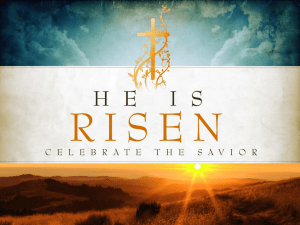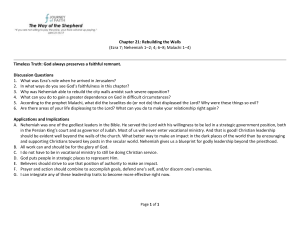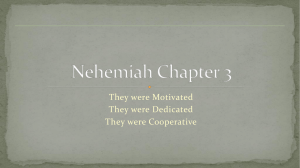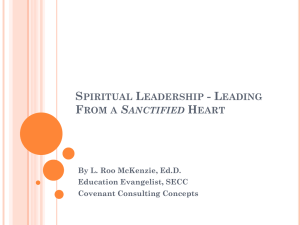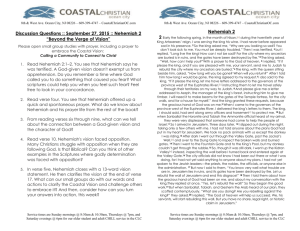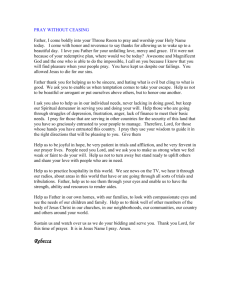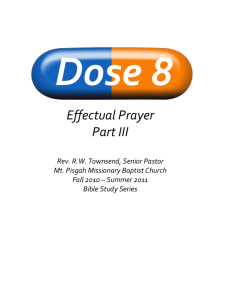CC student_163154.indd - Cornerstone Connections
advertisement
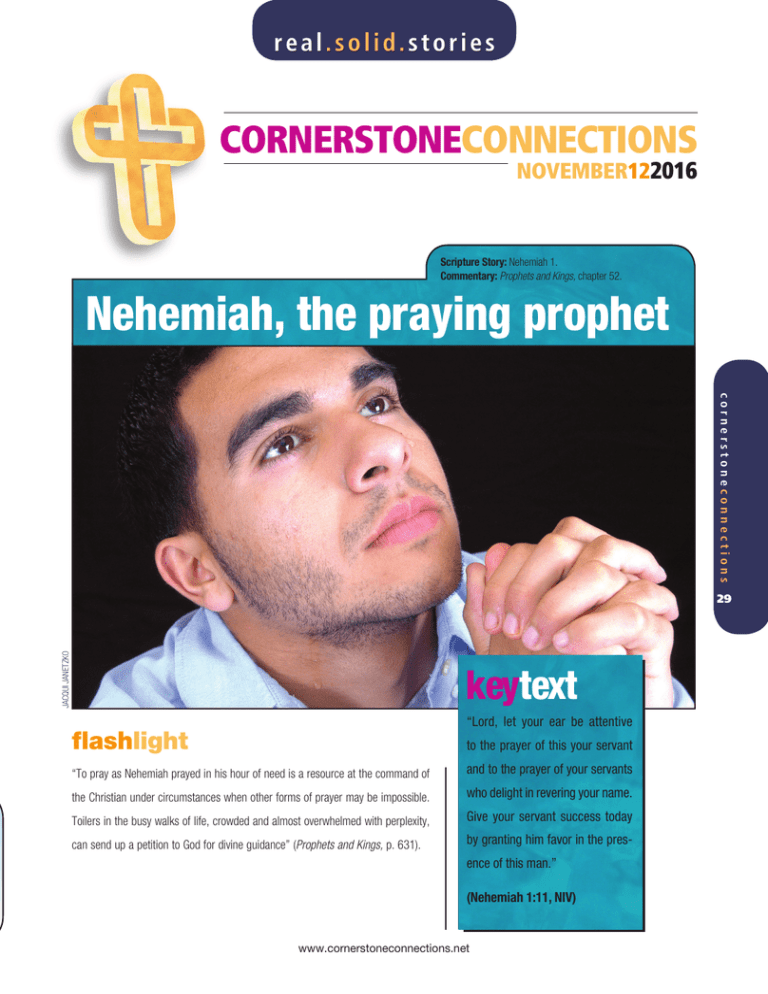
real.solid.stories CORNERSTONECONNECTIONS NOVEMBER122016 Scripture Story: Nehemiah 1. Commentary: Prophets and Kings, chapter 52. Nehemiah, the praying prophet cornerstoneconnections JACQUI JANETZKO 29 keytext “After she himattentive a drink, “Lord, let had yourgiven ear be flashlight shethesaid, ‘I’ll of draw your to prayer thiswater your for servant “To pray as Nehemiah prayed in his hour of need is a resource at the command of camels too, untilofthey finand to the prayer yourhave servants the Christian under circumstances when other forms of prayer may be impossible. isheddelight drinking’” who in revering your name. Toilers in the busy walks of life, crowded and almost overwhelmed with perplexity, can send up a petition to God for divine guidance” (Prophets and Kings, p. 631). Give your servant success today (Genesis 24:19, NIV). by granting him favor in the presence of this man.” (Nehemiah 1:11, NIV) www.cornerstoneconnections.net what do you think? cornerstoneconnections Either/Or The experience of praying is more meaningful to me when I pray . . . individually or with others. What do you think are the kinds of things we ought to pray for individually in contrast to the things we should pray for corporately? _______________________________________ ______________________________________ _____________________________________ ____________________________________ 30 did you know? here are two types of “ask” used in the Greek language: Ask (aiteo) refers to asking as an inferior to a superior. Ask (eratao) refers to asking as an equal with authority. What difference does it make? Read John 14:14 (aiteo) and 16 (eratao), and think about how this might change the way you pray. INTO THE STORY “The words of Nehemiah son of Hakaliah: In the month of Kislev in the twentieth year, while I was in the citadel of Susa, Hanani, one of my brothers, came from Judah with some other men, and I questioned them about the Jewish remnant that had survived the exile, and also about Jerusalem. They said to me, ‘Those who survived the exile and are back in the province are in great trouble and disgrace. The wall of Jerusalem is broken down, and its gates have been burned with fire.’ “When I heard these things, I sat down and wept. For some days I mourned and fasted and prayed before the God of heaven. Then I said: ‘Lord, the God of heaven, the great and awesome God, who keeps his covenant of love with those who love him and keep his commandments, let your ear be attentive and your eyes open to hear the prayer your servant is praying before you day and night for your servants, the people of Israel. I confess the sins we Israelites, including myself and my father’s family, have committed against you. We have acted very wickedly toward you. We have not obeyed the commands, decrees and laws you gave your servant Moses. “‘Remember the instruction you gave your servant Moses, saying, “If you are unfaithful, I will scatter you among the nations, but if you return to me and obey my commands, then even if your exiled people are at the farthest horizon, I will gather them from there and bring them to the place I have chosen as a dwelling for my Name.” They are your servants and your people, whom you redeemed by your great strength and your mighty hand. Lord, let your ear be attentive to the prayer of this your servant and to the prayer of your servants who delight in revering your name. Give your servant success today by granting him favor in the presence of this man.’” (Nehemiah 1:1-11, NIV) OUT OF THE STORY punch lines “But if from there you seek the Lord your God, you will find him if you seek him with all your heart and with all your soul. When you are in distress and all these things have happened to you, then in later days you will return to the Lord your God and obey him. For the Lord your God is a merciful God; he will not abandon or destroy you or forget the covenant with your ancestors, which he confirmed to them by oath” (Deuteronomy 4:29-31, NIV). What is the key problem that prompts Nehemiah to pray? “Then you will call on me and come and pray to me, and I will listen to you” (Jeremiah 29:12, NIV). “Ask and it will be given to you; seek and you will find; knock and the door will be opened to you. For everyone who asks receives; the one who seeks finds; and to the one who knocks, the door will be opened” (Matthew 7:7, 8, NIV). Who are the “remnant” in this passage? Why are they described this way? Underline the words and phrases that convey the emotions that Nehemiah felt. What other characters in Scripture might understand Nehemiah’s burden? Explain. Examine the prayer of Nehemiah and identify key parts that you think might be important. What do you think is the “covenant of love” referred to in verse 5? In verse 11, what specifically does Nehemiah pray for? (You may have to read ahead in your Bible.) What is the message God has for you in this story? “What, then, shall we say in response to these things? If God is for us, who can be against us?” (Romans 8:31, NIV). further insight “Nehemiah did not regard his duty done when he had wept and prayed before the Lord. He united his petitions with holy endeavor, putting forth earnest, prayerful efforts for the success of the enterprise in which he was engaged.” (Ellen G. White, Prophets and Kings, p. 634) “God’s children are not only to pray in faith but to work with diligent and wise care.” (Ellen G. White, Royalty and Ruin, p. 223) cornerstoneconnections “Therefore confess your sins to each other and pray for each other so that you may be healed. The prayer of a righteous person is powerful and effective” (James 5:16, NIV). 31 connectingtoLIFE Sabbath A s we give ourselves in loving service to those around us and in witnessing to His salvation, His constant presence with us through the Spirit transforms every moment and every task into a spiritual experience” (Fundamental Belief 11, Growing in Christ). cornerstoneconnections As you respond to the What Do You Think? section of this week’s lesson, read a portion of a letter from Paul in Philippians 1:3-5. How does Nehemiah’s prayer for help for his people compare with Paul’s? How are they alike? How are they different? What do you think it is easier to pray for, mundane ordinary things or great and miraculous events? Why? 32 outcomes? How did that work out? When have you prayed more generally? to pray deliberately and specifically for these things to happen, and be willing to do whatever it takes to be part of the answer. Tuesday Friday Read Jeremiah 29:12. Read Isaiah 65:24. I n this week’s Flashlight quote from Prophets and Kings, Ellen White encourages Christians to pray in whatever way is feasible to have a conversation with God. Whom do you know that is a champion of prayer? How have you seen their prayer life impact the well-being of others? T hink about the times in your life that prayer has been especially helpful. There are times God brings comfort and peace, but there are also times God helps you get good things done in His name. Take time to thank God for His actions in the past as well as for His promises in the future. Thank You, Lord, for the times in the past that You answered my prayers by Sunday Read Nehemiah 1:1-11. R ead the passage in the Into the Story section of the student lesson and respond to the study questions provided. What parts of this story are new to you and what insights have you gained from this passage? As Nehemiah prays fervently for help to rebuild the walls of Jerusalem, what would this prayer sound like today? What key things would a leader be praying for? Wednesday Read Psalm 91:15. R ead the Punch Lines in this week’s lesson. Which passage, if acted on, would transform your spiritual life the most? Why? Choose one verse in the Punch Lines and talk to God about how you might live out that message today. Texts credited to NIV are from the Holy Bible, New International Version. Copyright © 1973, 1978, 1984, 2011, by Biblica, Inc. Used by permission. All rights reserved worldwide. Thursday Read Matthew 7:7, 8. Monday T he Key Text in this week’s lesson from Nehemiah 1:11 is a specific request to God: “Lord, let your ear be attentive to the prayer of this your servant and to the prayer of your servants who delight in revering your name. Give your servant success today by granting him favor in the presence of this man” (NIV). When in your life have you prayed for specific Thank You, Lord, for Your promises for the future that You will I n this week’s lesson Nehemiah prays to God for help from a king. Throughout history God has used many who don’t even believe in Him to be instruments in His plan. How do you see God using various events, people, and situations around the world to continue His work throughout the world? Nehemiah’s desire is earnest and single-minded. What three things do you think God would have us be “single-minded” about as a church? Why are they important? Begin www.cornerstoneconnections.net Scripture quotations marked NLT are taken from the Holy Bible, New Living Translation, copyright © 1996, 2004, 2007 by Tyndale House Foundation. Used by permission of Tyndale House Publishers, Inc., Carol Stream, Illinois 60188. All rights reserved. this week’s reading* Prophets and Kings, chapter 52. *Royalty and Ruin is a special adaptation of Prophets and Kings, created for you by the Ellen G. White Estate and Pacific Press. Get more information about it by going to www.cornerstoneconnections.net and clicking on “Conflict of the Ages series.” By following the weekly reading plan, you will read at least one book of the Conflict of the Ages Series each year.
